Book contents
- Frontmatter
- Contents
- Acknowledgments
- Contributors
- Introduction
- SECTION I BEYOND MARKET FAILURE
- SECTION II BEYOND THE ECONOMIC THEORY OF POLITICS
- SECTION III BEYOND COMMAND AND CONTROL
- 10 What Opportunity Is Knocking? Regulating Corporate Governance in the United States
- 11 Taxation as a Regulatory Tool: Lessons from Environmental Taxes in Europe
- 12 Redesigning Regulation: A Case Study from the Consumer Credit Market
- 13 Origins and Regulatory Consequences of the Subprime Crisis
- 14 The Prospects for Effective Coregulation in the United States: A Historian's View from the Early Twenty-First Century
- 15 Deregulation Theories in a Litigious Society: American Antitrust and Tort
- 16 Markets in the Shadow of the State: An Appraisal of Deregulation and Implications for Future Research
- Conclusion
- Index
- References
10 - What Opportunity Is Knocking? Regulating Corporate Governance in the United States
Published online by Cambridge University Press: 20 January 2010
- Frontmatter
- Contents
- Acknowledgments
- Contributors
- Introduction
- SECTION I BEYOND MARKET FAILURE
- SECTION II BEYOND THE ECONOMIC THEORY OF POLITICS
- SECTION III BEYOND COMMAND AND CONTROL
- 10 What Opportunity Is Knocking? Regulating Corporate Governance in the United States
- 11 Taxation as a Regulatory Tool: Lessons from Environmental Taxes in Europe
- 12 Redesigning Regulation: A Case Study from the Consumer Credit Market
- 13 Origins and Regulatory Consequences of the Subprime Crisis
- 14 The Prospects for Effective Coregulation in the United States: A Historian's View from the Early Twenty-First Century
- 15 Deregulation Theories in a Litigious Society: American Antitrust and Tort
- 16 Markets in the Shadow of the State: An Appraisal of Deregulation and Implications for Future Research
- Conclusion
- Index
- References
Summary
Introduction
A series of major corporate scandals around the turn of the millennium prompted a burst of regulatory changes that together represented the most significant development in corporate regulation since the New Deal. The most prominent reform was the Sarbanes-Oxley Act of 2002 (SOX), but the Securities and Exchange Commission (SEC) also implemented a host of important rule changes, and stock exchanges made significant alterations to their listing requirements. The new regulations elicited considerable controversy, with business elites and their political allies vehemently complaining about the burdens that they imposed on firms and managers. As the corporate scandals retreated from the front pages of newspapers, the impetus for reform waned. However, the recent change in the political leadership of the United States and, crucially, the context of a worsening financial crisis in which it occurred, seem certain to renew the momentum for further reform of the corporate economy.
The various proposals for increased regulation of America's corporations find intellectual support in academic research, where there is a lively debate about the villain of the piece in recent American corporate and financial scandals. Different diagnoses abound: Some scholars emphasize the failure of gatekeepers – especially auditors, analysts, and rating agencies – to protect investors; others stress the inadequacies of corporate boards as internal oversight mechanisms; still others focus on an alleged cause of weak corporate boards and other flaws in the governance of American corporations – insufficient rights for shareholders.
- Type
- Chapter
- Information
- Government and MarketsToward a New Theory of Regulation, pp. 335 - 362Publisher: Cambridge University PressPrint publication year: 2009



